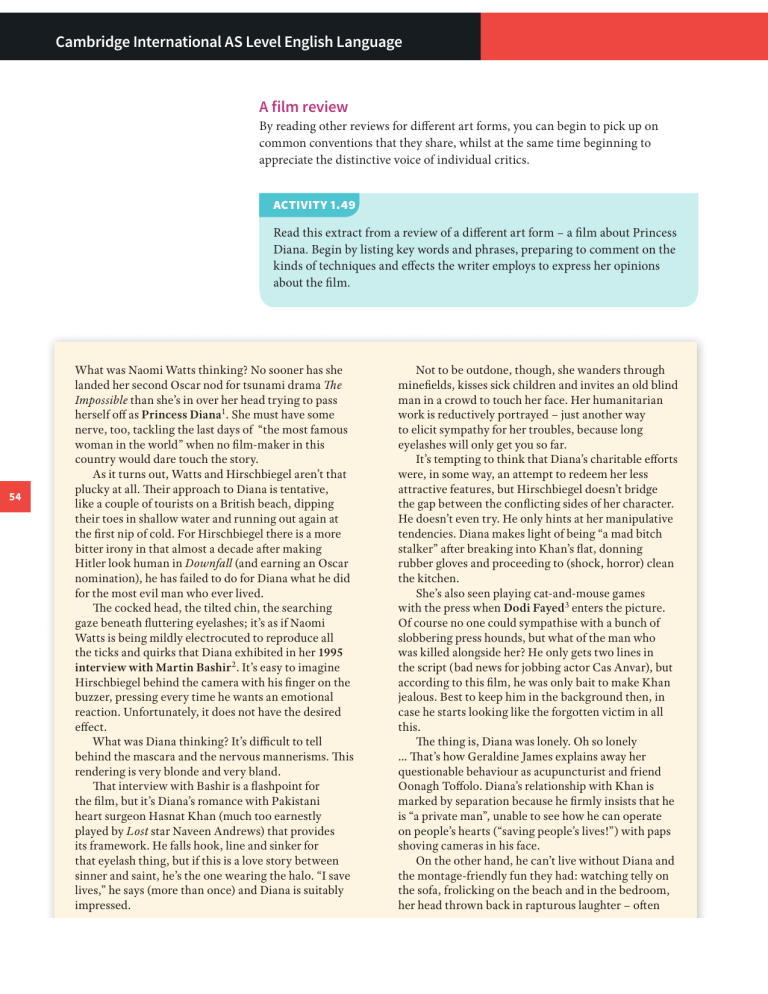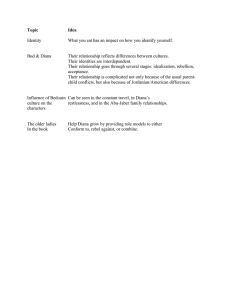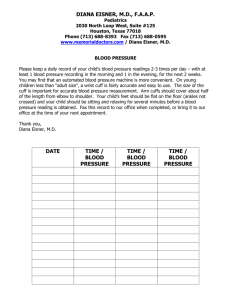
Cambridge International AS Level English Language A film review By reading other reviews for different art forms, you can begin to pick up on common conventions that they share, whilst at the same time beginning to appreciate the distinctive voice of individual critics. ACTIVITY 1.49 Read this extract from a review of a different art form – a film about Princess Diana. Begin by listing key words and phrases, preparing to comment on the kinds of techniques and effects the writer employs to express her opinions about the film. 54 What was Naomi Watts thinking? No sooner has she landed her second Oscar nod for tsunami drama The Impossible than she’s in over her head trying to pass herself off as Princess Diana1. She must have some nerve, too, tackling the last days of “the most famous woman in the world” when no film-maker in this country would dare touch the story. As it turns out, Watts and Hirschbiegel aren’t that plucky at all. Their approach to Diana is tentative, like a couple of tourists on a British beach, dipping their toes in shallow water and running out again at the fi rst nip of cold. For Hirschbiegel there is a more bitter irony in that almost a decade after making Hitler look human in Downfall (and earning an Oscar nomination), he has failed to do for Diana what he did for the most evil man who ever lived. The cocked head, the tilted chin, the searching gaze beneath fluttering eyelashes; it’s as if Naomi Watts is being mildly electrocuted to reproduce all the ticks and quirks that Diana exhibited in her 1995 interview with Martin Bashir 2 . It’s easy to imagine Hirschbiegel behind the camera with his fi nger on the buzzer, pressing every time he wants an emotional reaction. Unfortunately, it does not have the desired effect. What was Diana thinking? It’s difficult to tell behind the mascara and the nervous mannerisms. Th is rendering is very blonde and very bland. That interview with Bashir is a flashpoint for the fi lm, but it’s Diana’s romance with Pakistani heart surgeon Hasnat Khan (much too earnestly played by Lost star Naveen Andrews) that provides its framework. He falls hook, line and sinker for that eyelash thing, but if this is a love story between sinner and saint, he’s the one wearing the halo. “I save lives,” he says (more than once) and Diana is suitably impressed. Not to be outdone, though, she wanders through minefields, kisses sick children and invites an old blind man in a crowd to touch her face. Her humanitarian work is reductively portrayed – just another way to elicit sympathy for her troubles, because long eyelashes will only get you so far. It’s tempting to think that Diana’s charitable efforts were, in some way, an attempt to redeem her less attractive features, but Hirschbiegel doesn’t bridge the gap between the confl icting sides of her character. He doesn’t even try. He only hints at her manipulative tendencies. Diana makes light of being “a mad bitch stalker” after breaking into Khan’s flat, donning rubber gloves and proceeding to (shock, horror) clean the kitchen. She’s also seen playing cat-and-mouse games with the press when Dodi Fayed3 enters the picture. Of course no one could sympathise with a bunch of slobbering press hounds, but what of the man who was killed alongside her? He only gets two lines in the script (bad news for jobbing actor Cas Anvar), but according to this film, he was only bait to make Khan jealous. Best to keep him in the background then, in case he starts looking like the forgotten victim in all this. The thing is, Diana was lonely. Oh so lonely … That’s how Geraldine James explains away her questionable behaviour as acupuncturist and friend Oonagh Toffolo. Diana’s relationship with Khan is marked by separation because he fi rmly insists that he is “a private man”, unable to see how he can operate on people’s hearts (“saving people’s lives!”) with paps shoving cameras in his face. On the other hand, he can’t live without Diana and the montage-friendly fun they had: watching telly on the sofa, frolicking on the beach and in the bedroom, her head thrown back in rapturous laughter – often Part 1 Unit 1: Reading non-fiction at serious risk of tipping the wig she wore to disguise herself. Then there were the late-night dinners at Chicken Cottage, presumably because that’s the only place open after midnight. The dialogue is as stodgy as the contents of a bargain bucket. Khan occasionally throws a little poetry into the mix, but very often they’re just attacking each other with the blunt realities of the situation, i.e. that she is the most famous woman in the world and he’s busy (saving lives!). When Hasnat calls Diana to the middle of Hyde Park in the dead of the night for yet another round of stating the blindingly obvious, the only burning question that springs to mind is, ‘Was the Chicken Cottage not open?’ The park is a strange place to meet except that it offers Watts the chance to do a Tom Cruise and run off at speed through the dark empty streets, with strained expression, cursing a world that seems to be against her. And Hirschbiegel gets to tick off yet another cliché. Truth? Maybe you can’t handle the truth. From a review by Stella Papamichael, Radio Times. 1 Princess Diana formerly married to Prince Charles, heir to the British throne 2 1995 interview with Martin Bashir a famous TV interview after her divorce 3 Dodi Fayed Diana’s partner at the time of her death ACTIVITY 1.50 1 Working in small groups, divide up the following features and look for them in this extract: Q the use of apparent compliments which are then undercut Q the use of direct statements to state a viewpoint clearly Q words and phrases that create a downbeat tone Q the use of contrasts Q the use of adjectives and adverbs which reveal tone or perspective Q the use of internal thoughts as if the reviewer is thinking out loud Q points where the reviewer’s voice emerges openly. 2 When you have finished, discuss: Q what you think the reviewer’s opinion is, Q how you would describe it. You will need to go beyond saying that she likes/dislikes the film and find a way of expressing the tone of the critic. FURTHER RESEARCH Look for other reviews of plays, film, books, concerts or television programmes in newspapers, magazines and online. Choose two or three and use them to practise writing further analyses, adopting the techniques suggested above. Further practice Now, take at least two or three of the aspects from the bulleted list above and write a partial analysis of the language and style of this fi lm review. Explore how the writer’s response to the film is presented. A restaurant review Read this review. It is a food critic’s opinion about his experience of eating in a particular restaurant. As you read, pick out words and phrases that indicate: Q Q Q the writer’s state of mind, and how thoughts ‘pop’ up in the review his observations about the place and the food, and how that changes or develops specific details that indicate his own knowledge, or lack of it (how much is he pretending not to know a lot?) 55

